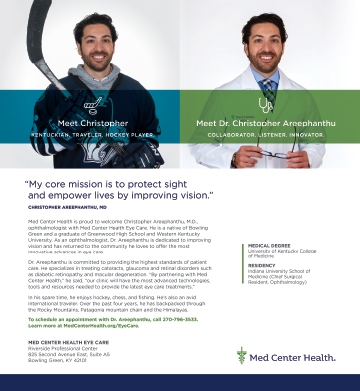You probably won’t be surprised to learn that the American Academy of Ophthalmology has designated 2020 as “the Year of the Eye.” Everyone wishes they had perfect 20/20 vision, but many of us don’t – and getting the proper vision care can be a life-changing experience. Anyone who wears glasses can probably remember that first moment of clarity, whether as a child who can see a classroom whiteboard clearly for the first time, or an adult noticing individual leaves on trees.
The Centers for Disease Control and Prevention (CDC) estimates that around 61 million people in the U.S. are at high risk of vision loss. Unfortunately, only about half of those people visited an eye doctor in the past year. Just like taking care of your body and your teeth, taking care of your eyes is an important part of overall health. How often you get an eye exam depends on your age and overall health.
•Screenings for vision problems should begin as early as three-five years old. Amblyopia (lazy eye) is the most common vision problem found in young children and is caused by the eye and brain not working well together. Finding this early and getting prompt treatment can help avoid vision loss.
•People with diabetes should have a dilated eye exam every year.
•Anyone at high risk for glaucoma should have a dilated eye exam every two years. This includes African Americans 40 years and older, all adults older than 60, and people with a family history of glaucoma.
Your eyes and diabetes
One of the most common complications of diabetes is diabetic retinopathy. This is because high blood sugar can damage blood vessels in a light-sensitive part of your eye called the retina. That damage can lead to scarring and cause permanent vision loss. Finding diabetic retinopathy early could prevent or delay blindness in up to 90% of people with diabetes.
If you have diabetes, you are also at higher risk for glaucoma and cataracts. Glaucoma refers to a group of diseases that can cause pressure from fluid to build up in your eyes and damage the optic nerve – the “highway” that sends vision signals from your eye to your brain. Think of damage to the optic nerve as a crash on that highway. If the signals can’t get through the damage to reach your brain, your vision will be impaired or even totally fail. Glaucoma is the leading cause of blindness in the U.S.
Cataracts are usually part of the normal aging process, as the lens in the eye becomes cloudy. This usually doesn’t become noticeable until people are in their 60s or older. Diabetes can make it show up in younger people or be more severe in those who are older. Maintaining good control of blood sugar and protecting your eyes from the sun by wearing sunglasses can help reduce the risk of cataracts.
Optometrist or Ophthalmologist – what’s the difference?
Ophthalmologists and optometrists work in tandem with the entire eye care team to deliver your total package of eye care needs. Optometrists complete four years of optometry school where they master skills necessary to provide primary eye care and vision testing. Ophthalmologists, on the other hand, are medical doctors and spend four years after medical school honing their skills as eye surgeons and learning how to treat complex eye diseases.
Med Center Health recently announced the opening of the Med Center Health Eye Care. Ophthalmologist Christopher Areephanthu, M.D., is a native of Bowling Green and has returned to his hometown to offer the best care available for patients who have moderate to severe eye conditions. He specializes in treating cataracts, glaucoma and retinal disorders such as diabetic retinopathy and macular degeneration.
“After being away from Bowling Green, Kentucky for the past 8 years to complete my medical training,” Dr. Areephanthu said, “I am beyond excited to return to the community I love. I have so much energy and passion to build an advanced eye care center with The Medical Center. This will be an invaluable resource for the residents of Bowling Green and the state of Kentucky as a whole.”
Dr. Areephanthu’s office is located in the Riverside Professional Center on the campus of The Medical Center at Bowling Green. To schedule an appointment, call 270-796-3533 or learn more at MedCenterHealth.org/EyeCare.
-submitted by Med Center Health


